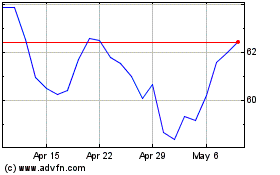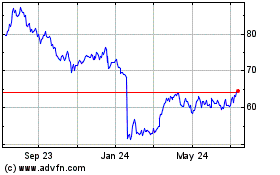By Shibani Mahtani and Andrew Tangel
CHICAGO -- The tide of companies moving back to big cities in
search of talent and better transportation links is growing,
reviving many downtowns at the expense of suburbs and smaller
communities.
Chicago's resurgence has been especially sharp. Nearly 90% of
the more than 330,000 jobs created in Illinois from 2011 through
2016 were added in the Chicago metro area, the Bureau of Labor
Statistics said.
Over 80 companies have moved their headquarters to or expanded
in the Chicago area since 2008, including Archer Daniels Midland
Co., Kraft Heinz Co., ConAgra Foods Inc. and Motorola Solutions
Inc., most of them from elsewhere in Illinois. Caterpillar Inc.
recently announced plans to relocate its headquarters to the
Chicago area from its longtime home three hours away in Peoria,
Ill., while McDonald's says it will move from suburban Oak Brook,
Ill., to the city's downtown area.
These companies have leased 5.7 million square feet of office
space, the biggest corporate relocation rental binge in any city in
the U.S., according to real-estate firm Jones Lang LaSalle.
Chicago's prime office rents rose 20% last year, the highest rate
in the nation, according to commercial real-estate brokerage CBRE
Group Inc.
"We had to be in a city where we could attract talent," said
Diane Pearse, chief executive of food company Hickory Farms LLC,
which moved to Chicago last month after 65 years in Toledo, Ohio.
"Staying in Toledo was just not an option."
As with other major cities, many companies left Chicago decades
ago as suburbia expanded and crime rose in urban centers. Big
companies built sprawling campuses far from downtown. Now the need
to attract new employees as baby boomers age out of the workforce
is pulling some back, said Darin Buelow, head of Deloitte
Consulting's real estate and location strategy practice.
"The pain that companies have been experiencing in talent
recruitment has outweighed the inconvenience and expense of picking
up and moving to the city," he said.
Companies, he added, are seeing their employees leave the
suburbs for city jobs and are unable to backfill those, as they
find it harder to persuade talent to move to suburban campuses.
More young people are living in the biggest U.S. cities than
anytime since the 1970s. And 35 of the country's largest
metropolitan areas had lower unemployment than the nationwide rate
of 4.9% in February, according to the Bureau of Labor
Statistics.
That is bad news for the communities companies leave behind,
like Caterpillar's longtime home of Peoria. With a population of
about 115,000, Peoria lacks the cultural and sporting events
available in Chicago, as well as the quick travel links via the
city's two major airports.
The maker of construction and mining equipment last year opened
an office for data analysts in downtown Chicago. Months later,
Caterpillar shocked residents of Peoria with plans to move its
headquarters and about 300 employees to the Chicago area. The
company hasn't said whether it will move to the city or its
suburbs.
Recruiting in Peoria was too difficult, said Amy Campbell,
Caterpillar's director of investor relations. "Our customers, our
employees, our shareholders, our potential investors are all global
and outside Illinois," she said. "It's so much easier to get into
Chicago than...to drive or connect down to Peoria."
U.S. Rep. Darin LaHood, the Republican whose district includes
Peoria, called the move a betrayal. Some residents fear that
Caterpillar will move more of the remaining 12,000 workers from the
Peoria area. Others worry that the chunk of downtown where
Caterpillar was planning a new headquarters will remain vacant.
Peoria Mayor Jim Ardis said developers already have expressed
interest in the site. He said health care, medical research and
higher education are growing in the city. "It's not the end of the
world for us," Mr. Ardis said.
In Chicago, the relocations are giving Mayor Rahm Emanuel a
boost while he battles a surge in violent crime. Homicides were up
58% in 2016, a bigger single-year increase than any major U.S. city
has seen in a quarter-century. President Donald Trump has said
Chicago's crime wave is the result of failed Democratic
policies.
Mr. Emanuel has taken a personal role in recruiting companies.
Ms. Pearse of Hickory Farms said the mayor called her early last
summer. Motorola Solutions decided to move to Chicago after Mr.
Emanuel made a pitch to Chief Executive Greg Brown during a 2011
Bulls game.
"I said, 'Rahm, you know it might be possible to move a couple
of hundred jobs downtown,'" Mr. Brown said. "Every time I threw out
one number, he would raise it."
Chicago gives tax breaks to businesses on the West and South
Sides where crime has surged, but not to companies moving
downtown.
Mr. Emanuel makes unsolicited calls to executives at companies
he believes might consider a move to Chicago. He recently emailed
100 chief executives in the San Francisco Bay Area a report citing
Chicago's lowest cost of living among the 10 biggest U.S.
cities.
But the mayor says the attention he gives employers is as
valuable as the city's low residential rents. "If you move here,
you know that this isn't the last time we're talking," he said.
Write to Shibani Mahtani at shibani.mahtani@wsj.com and Andrew
Tangel at Andrew.Tangel@wsj.com
(END) Dow Jones Newswires
April 11, 2017 05:44 ET (09:44 GMT)
Copyright (c) 2017 Dow Jones & Company, Inc.
Archer Daniels Midland (NYSE:ADM)
Historical Stock Chart
From Mar 2024 to Apr 2024

Archer Daniels Midland (NYSE:ADM)
Historical Stock Chart
From Apr 2023 to Apr 2024
